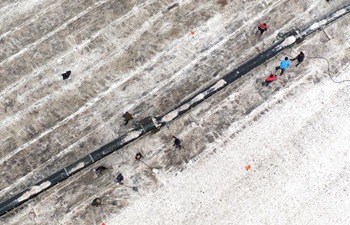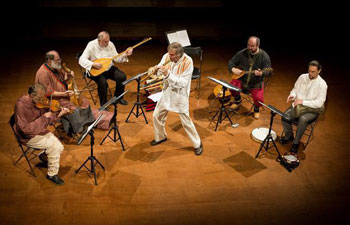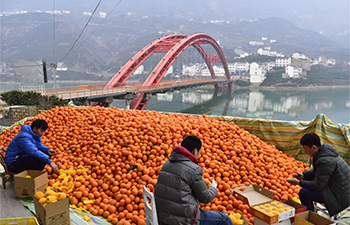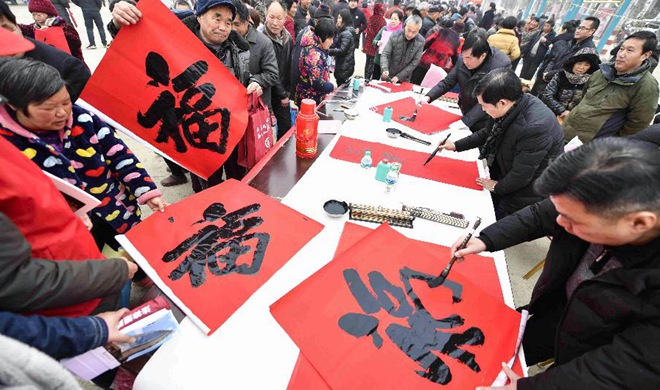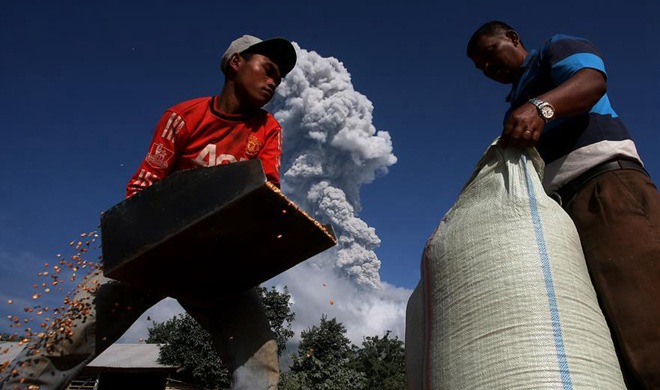UNITED NATIONS, Jan. 18 (Xinhua) -- UN Secretary-General Antonio Guterres on Thursday warned that threats posed by weapons of mass destruction seem to be gathering force in today's world.
Global anxieties about nuclear weapons are at the highest level since the end of the Cold War; trust on nuclear and other issues between the United States and Russia continues to ebb; the Iran nuclear deal is being questioned; the use of chemical weapons in Syria seriously challenges the global taboo against these weapons of mass destruction, Guterres told a high-level debate at the Security Council on weapons of mass destruction.
"The situation on the Korean Peninsula is the most tense and dangerous peace and security challenge in the world today. I remain deeply concerned over the growing risk of military confrontation and the unimaginable consequences that would result," said Guterres.
He welcomed the firm decisions the Security Council has taken in response to nuclear tests and ballistic missile launches by the Democratic People's Republic of Korea (DPRK) in defiance of Security Council resolutions, saying the resolutions must be fully implemented.
At the same time, he said, the council's unity also paved the way for diplomatic engagement. "I welcome the reopening of inter-Korean communication channels, especially military-to-military. This is critical to lower the risk of miscalculation or misunderstanding and to reduce tensions."
The UN chief also welcomed the DPRK's decision to participate in the upcoming Winter Olympics in South Korea.
"We need to build on these small signs of hope, and expand diplomatic efforts to achieve the peaceful de-nuclearization of the Korean Peninsula in the context of regional security."
On the lack of trust between the two major military powers in the world -- the United States and Russia, he warned that vital strategic arms reduction measures established during and after the Cold War are under threat. "After the expiration of New START in 2021, there seems to be no new arms control negotiations under way."
New START (Strategic Arms Reduction Treaty) is a nuclear arms reduction treaty signed between the United States and Russia in April 2010 and entered into force in February 2011. It is expected to last till 2021.
On Syria, he said if the use of chemical weapons in the country is once again determined, the international community needs to find an appropriate way to identify those responsible and hold them to account. "Without such an avenue, we are allowing the use of chemical weapons to take place with impunity."
He expressed the hope that the Security Council can return to unity on this issue, referring to Russia's veto of the extension of the mandate for a joint investigative mechanism of the Organisation for the Prohibition of Chemical Weapons (OPCW) and the United Nations on the use of chemical weapons in Syria, leading to the disintegration of the mechanism.
In the case of the Biological Weapons Convention, which does not have a formal verification mechanism, a system of confidence-building measures has contributed to enhancing transparency, said Guterres.
These measures are intended to "prevent or reduce the occurrence of ambiguities, doubts and suspicions" through the provision of annual information on national bio-defense programs, high containment laboratories, legislative frameworks and vaccine production. Unfortunately, participation has been less than satisfactory, with fewer than half of the state parties regularly providing information, he said.
The threats posed by weapons of mass destruction and their means of delivery are taking place in an environment of increasing military budgets and the over-accumulation of weapons. And they are coupled with a serious growth in regional tensions, the UN chief pointed out.
"In such a geopolitical context, confidence-building measures that support arms control, non-proliferation and the elimination of weapons of mass destruction are extremely important."
By increasing understanding of others' positions and allowing information sharing on military budgets, strategic outlooks and troop movements, countries can help to decrease tension and avert conflict, said the UN chief.
Trust is essential. But confidence is undermined by bellicose rhetoric, confrontational approaches, the absence of communication channels, and inflexible positions, he noted.
Engaging in disarmament, non-proliferation and arms control measures are, in and of themselves, confidence-building, he said.
By removing the threat posed by weapons, arms control and non-proliferation mechanisms provide the breathing space for dialogue, boost confidence in parties' intentions and lay the groundwork for building the trust necessary to end conflicts.
"Nowhere was this more apparent than in the ground-breaking arms control agreements of the late 1980s and early 1990s that contributed to the peaceful end to the Cold War. It is, therefore, alarming to see historic accords such as the Treaty on Intermediate-Range Nuclear Forces and the Open Skies Treaty under question."
Effective verification mechanisms have proved to be some of the most successful and enduring types of confidence-building measures, he said. "From the ground-breaking verification protocols of the Strategic Arms Reduction Treaty to the invaluable work undertaken by the IAEA and the OPCW, verification builds confidence."
He said the United Nations can play a central role in assisting member states to develop, augment and support confidence-building measures. "The United Nations' position as an 'honest broker' allows us to act as a venue in which all parties can engage in dialogue -- whether for the development of new norms and values, or to resolve existing disputes and promote understanding."
The Security Council, he said, can provide leadership by demonstrating unity and continuing to highlight the importance of dialogue and diplomacy as an essential means for building confidence.
A measure that all member states can undertake is the universal and complete implementation of all disarmament and non-proliferation obligations.
"I appreciate that due to resource and other constraints, the implementation of disarmament, arms control and non-proliferation commitments can prove difficult for some member states. I therefore call on all states able to do so to provide the necessary capacity-building assistance."
The development of practical confidence-building measures is an important means of achieving the United Nations' mandate to save succeeding generations from the scourge of war. However, they are not an end in themselves, said Guterres.
Preventing, mitigating and resolving conflict requires comprehensive political solutions that include dialogue and negotiation and, in cases involving weapons of mass destruction, verifiable disarmament and non-proliferation.
"I believe the current international situation underscores the need to reframe and modernize long-standing disarmament and non-proliferation priorities. Deepening divisions and persistent stagnation in this field are exacerbating international tensions and creating new dangers."






